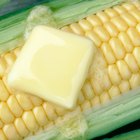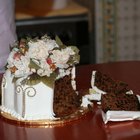
Fruit cake is a sweet pastry that has existed for centuries. Ancient Egyptians and Romans both has their own versions of the modern day cake. Today, fruit cakes are famous for having a prolonged shelf life. This is due in part to the different preservative agents found among fruit cake's ingredients. Alcohol and sugar both deter mold growth. Chemical additives and proper storage methods also prevent mold while preserving fruit cake for several months.
Alcohol
Fruit cakes that have been soaked in rum or brandy are less susceptible to mold. The alcohol acts as a preservative that prevents the growth of mold. Fruit cakes that contain alcohol can last for several months and still be edible as long as they have been properly stored. The alcohol also adds moisture to the inside of the cake without making the outside moist and susceptible to mold growth.
Sugar
Sugar is a major ingredient in fruit cake. The outside of fruit cake is often dusted with a layer of powdered sugar. Sugar helps prevent mold growth in many foods. Sugar dehydrates the food it is in by drawing water out from the interior and inserting sugar molecules into the the interior. This process reduces the amount of free water molecules that mold microbes require to grow and survive. Fruit cake's high sugar content is helpful in the prevention of mold growth.
Calcium or Sodium Propionate
Calcium propionate is a food additive used in breads and rolls. This additive prevents the growth of mold and is safe to ingest. Sodium propionate similarly prevents mold growth. It is added to cakes, pies and other pastries because it does not have an effect on the necessary leavening agents. The calcium in calcium propionate alters the chemical actions in leavening. Manufactured fruit cakes may contain these anti-mold preservatives.
Proper Storage
Although fruit cakes can contain multiple anti-mold agents, it is still necessary that the pastries are properly stored to ensure that mold growth does not occur for as long as possible. Fruit cake enthusiasts suggest soaking a cloth in the same type of liquor as used in a cake's ingredients, wrapping the cloth around the cake, wrapping foil over the covered cake and storing it in a cool, dark place. This method is supposed to allow the cake to last for years without growing mold. Fruit cakes can also be refrigerated and frozen to discourage mold growth.
Related Articles

How to Store Homemade Fruitcakes

How Long Is Cake Safe to Eat?

How Long Can a Brandy-Soaked Fruitcake ...

Common Food Emulsifiers

Does Cream-Based Frosting Have to Be ...

Does Baking Dough Kill Bacteria?
How to Freeze a Fruitcake

How to Make a Box Cake Firmer to Frost

Can a Cream Cheese-Decorated Cake Be ...
Can I Eat a Fruitcake From Last Year?

Foods From Rainforest Plants

How to Defrost a Frozen Cake With ...

How Early Can You Make a Wedding Cake?

Does Seven-Minute Frosting Need to Be ...

Calories in a Funfetti Cake With ...

Proper Storage of a Carrot Cake

Why Eat Wedding Cake One Year Later?

What Kind of Flour to Use for Cupcakes?

Can I Preserve Cake Forever?

Do Boston Cream Pie Cupcakes Need ...
References
Writer Bio
Sarah Clark has been writing since 1997, with work appearing in Northern Arizona University's "Student Life Organization Newsletter." She holds a B.A. in anthropology with a minor in art history from Northern Arizona University.
Photo Credits
Comstock Images/Comstock/Getty Images